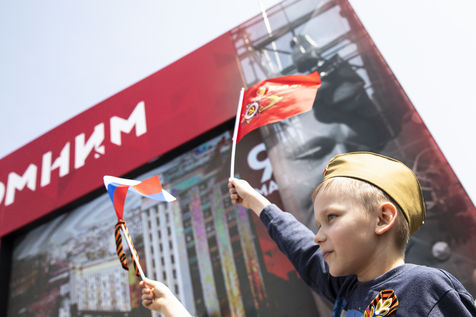Heroes Factory
9 mai 2019 à Moscou, le « Jour de la Victoire » des russes contre l'Allemagne nazie. Soixante-quatorze ans après la fin de la Seconde Guerre mondiale, un immense cortège civil - le « Régiment Immortel » - se prépare place Pouchkine, au nord du Kremlin. Près d'un million de personnes vont traverser la ville pour arriver au centre de la place Rouge. 10 millions de personnes défilent ce même jour dans toute la Russie et à travers le monde dans près de 80 pays où une communauté russe est présente. A la manière d'une procession religieuse, les gens portent telles des icônes de grandes photos de leurs ancêtres - parents, grands-parents, arrière-grands-parents - qui ont participé à la Grande Guerre patriotique russe de 1941 à 1945.
En quelques années ces cortèges sont devenus incontournables. Ce qui était à l'origine un mouvement de citoyens, familial, apolitique, non gouvernemental et non commercial, a rapidement été récupéré par des organisations plus politisées. Le « Régiment Immortel » est devenu le symbole de l'unité du peuple russe autour de ses héros. Un succès extraordinaire encouragé par les autorités russes qui assurent désormais l'organisation du défilé auquel Vladimir Poutine participe lui-même chaque année depuis 2015 en portant le portrait de son père blessé au combat.
La tradition familiale s'est transformée en une gigantesque fête nationaliste et les enfants de tous âges y sont étonnamment nombreux. Affublés très souvent d'uniformes et de casquettes militaires, ils marchent et imitent leurs parents, au rythme des chants militaires russes.
En participant à ce gigantesque culte du héros russe qui ne saurait être que militaire, le Régiment Immortel est désormais la partie visible d'un mouvement de nationalisme et de militarisation vaste et profond des consciences dont les enfants sont les principales cibles.
Série sur demande
https://spark.adobe.com/page/T4rh4aYBO42lq/
Heroes Factory
May 9, 2019 in Moscow. The "Victory Day" of the Russians against Nazi Germany. Seventy-four years after the end of the Second World War, a huge civilian procession - the "Immortal Regiment" - is being prepared in Pushkin Square, north of the Kremlin. Nearly a million people will pass through the city to reach the centre of Red Square. 10 million people march that same day throughout Russia and in parallel in nearly 80 countries around the world where a Russian community is present.
In the manner of a religious procession, people carry, like icons, enlarged photos of their ancestors - parents, grandparents, great-grandparents - who took part in the Great Russian Patriotic War from 1941 to 1945.
These processions have become unavoidable in just a few years. What was once a citizen's movement, family-oriented, apolitical, non-governmental and non-commercial, was quickly taken over by more politicized organizations. The "Immortal Regiment" became the symbol of the unity of the Russian people around its heroes. An extraordinary success encouraged by the Russian authorities who now take charge of the organisation of the parade in which Vladimir Putin has taken part every year since 2015, bearing the portrait of his father wounded in battle.
The family tradition has turned into a gigantic nationalist festival and children of all ages are surprisingly numerous. Very often wearing military uniforms and caps, they march and imitate their parents, to the rhythm of Russian military songs.
By taking part in this gigantic cult of the Russian hero which would be only military, the Immortal Regiment is the visible part of a movement of nationalism and militarization vast and deep of consciences of which children are the main targets.
https://spark.adobe.com/page/3riu6UL60NEQS/

























































